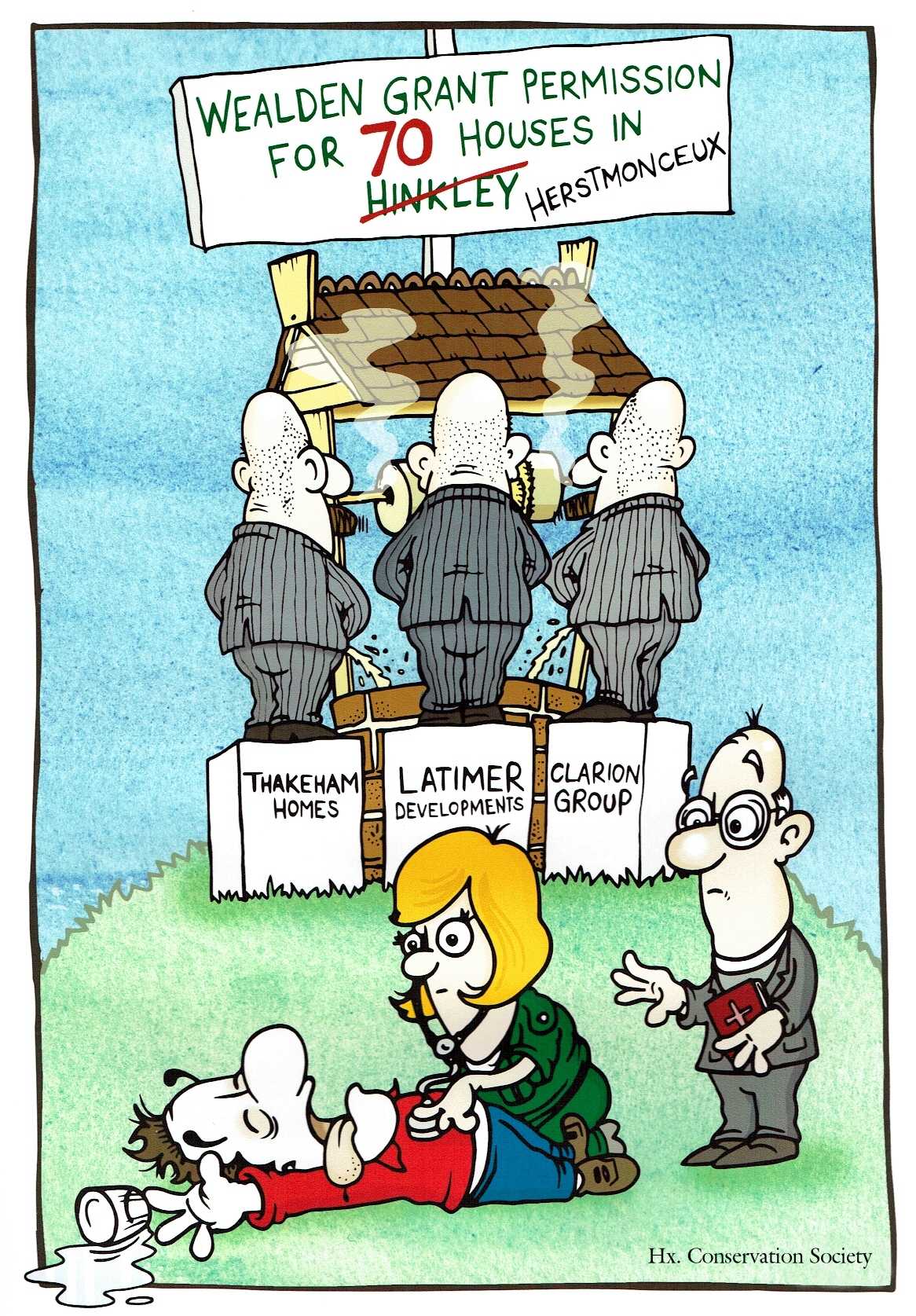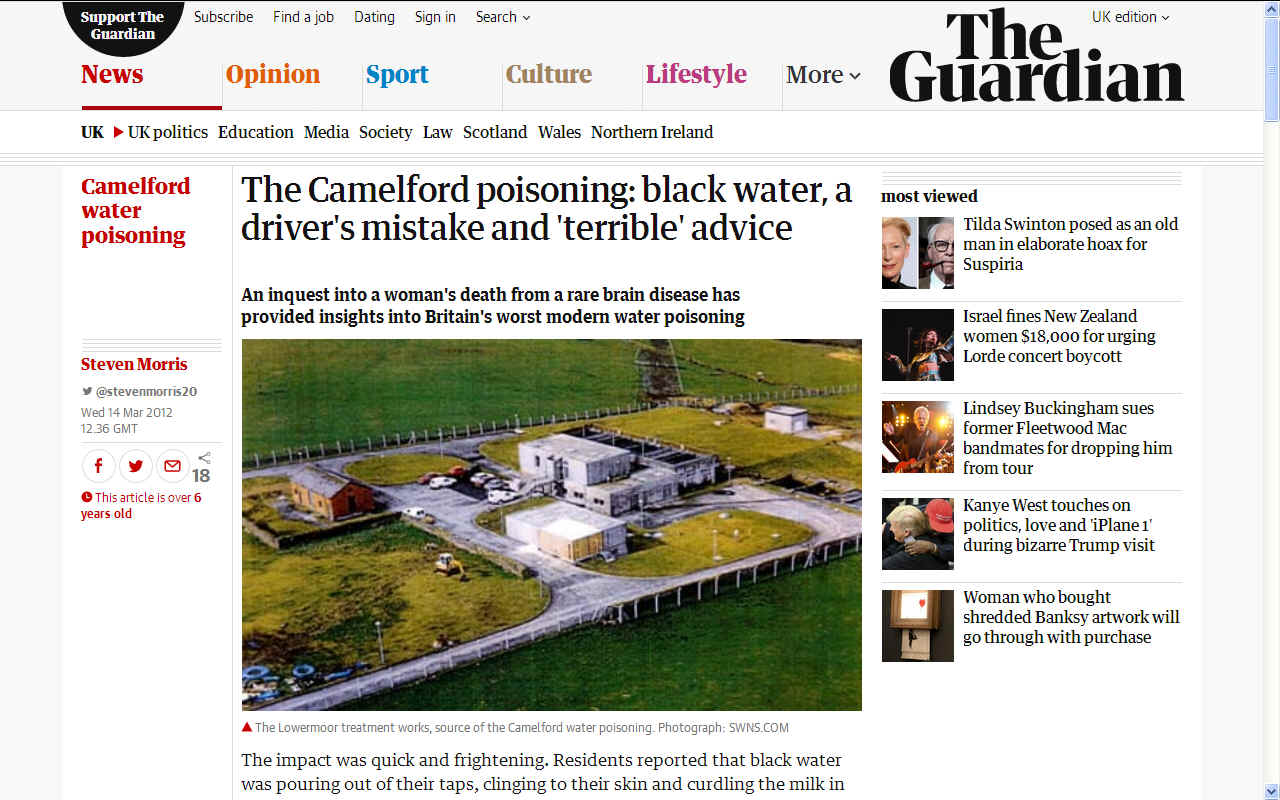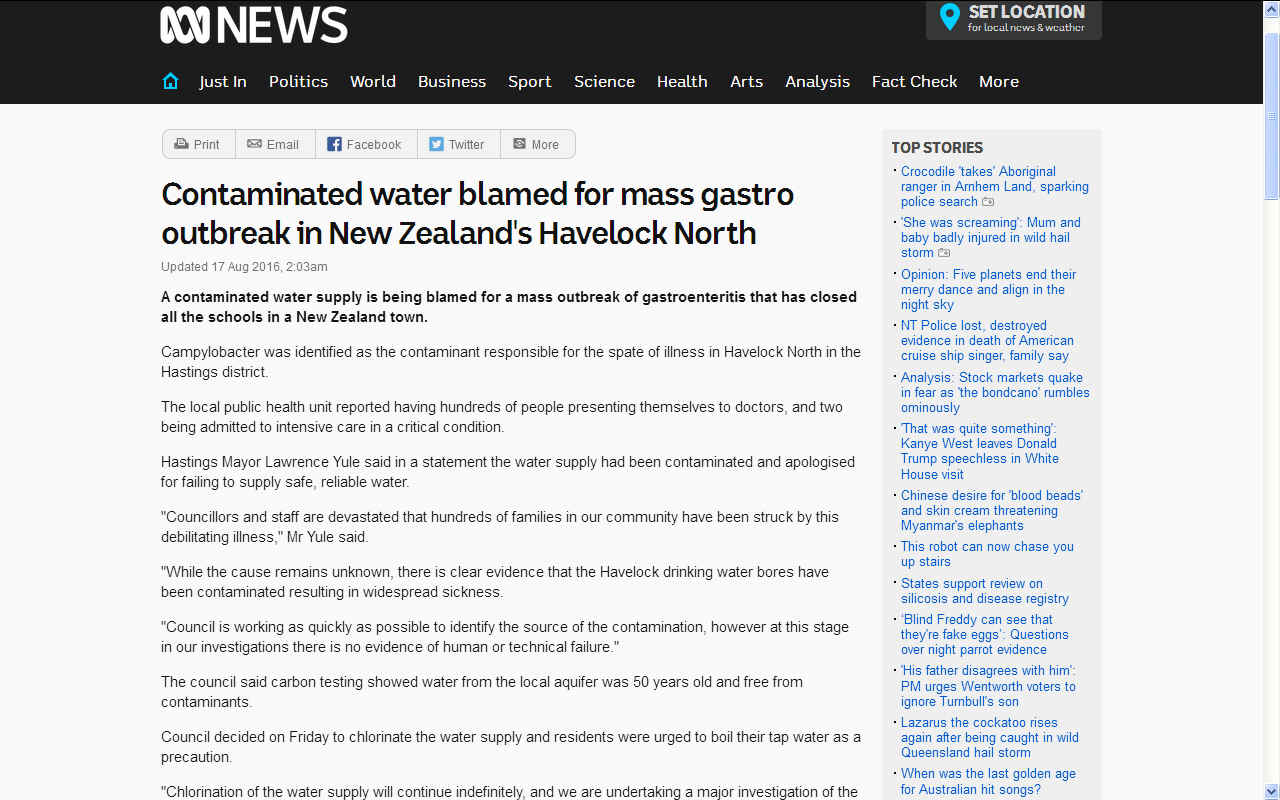ABC
NEWS - Contaminated water blamed for mass gastro outbreak in New Zealand's Havelock North
- 17 Aug 2016
A contaminated water supply is being blamed for a mass outbreak of gastroenteritis that has closed all the schools in a New Zealand town.
Campylobacter was identified as the contaminant responsible for the spate of illness in Havelock North in the Hastings district.
The local public health unit reported having hundreds of people presenting themselves to doctors, and two being admitted to intensive care in a critical condition.
Hastings Mayor Lawrence Yule said in a statement the water supply had been contaminated and apologised for failing to supply safe, reliable water.
"Councillors and staff are devastated that hundreds of families in our community have been struck by this debilitating illness," Mr Yule said.
"While the cause remains unknown, there is clear evidence that the Havelock drinking water bores have been contaminated resulting in widespread sickness.
"Council is working as quickly as possible to identify the source of the contamination, however at this stage in our investigations there is no evidence of human or technical failure."
The council said carbon testing showed water from the local aquifer was 50 years old and free from contaminants.
Council decided on Friday to chlorinate the water supply and residents were urged to boil their tap water as a precaution.
"Chlorination of the water supply will continue indefinitely, and we are undertaking a major investigation of the cause of the contamination to help us ensure this cannot happen again," Mr Yule said.

WATER
CONTAMINATION - If houses are built on the hill that supplies the last
surviving well in Herstmonceux, all of those who presently enjoy a
sustainable water supply are likely to be poisoned by pesticides from a
number of the
gardens of the proposed housing - at the moment that looks like being 28
units positioned directly above and in the groundwater soakage line of fire. In addition, where the hard standings of
the proposed 70 houses are to be gully drained to a point lower than the
twin wells, rainwater soakage that supplies the wells will be diverted away
potentially starving the wells of water, save that from the garden areas
that are impossible to gully.
The amusing cartoon above portrays the situation that perhaps the present developers
(Clarion,
Latimer,
Thakeham)
were not aware of, when they bought into a situation that they
should have been able to rely on.
Unfortunately, the council concerned and
the advisers to the original applicants (Gleeson
Developments) appear to have been less diligent
than they might have been in the rush to profit from a windfall situation.
The question that is probably on your lips is: "Was that an
oversight, or was it deliberate"?
Another
problem that is rearing it's head with many developments is that
corporations are building what they want to build without constructing the
affordable unit quotient or making improvement to drainage and access
roads that some council's have been kind enough to overlook at the grant
stage with a promise from developers to overcome, when in fact those
developers simply vanish without trace, leaving nobody to pick up the tab.
In other words development is never completed to a stage where flooding
and other contamination measures are safe.


Draft Statutory Instruments
2009 No.
Environmental Protection, England And Wales
The Groundwater (England and Wales) Regulations 2009
These Regulations are made in exercise of the powers conferred by section 2 of, and Schedule 1 to, the Pollution Prevention and Control Act 1999(1).
The Secretary of State, in relation to England, and the Welsh Ministers, in relation to Wales, have in accordance with section 2(4) of that Act consulted—
(a) the Environment
Agency;
(b) such bodies or persons appearing to them to be representative of the interests of local government, industry, agriculture and small businesses respectively as they consider appropriate; and
(c) such other bodies or persons as they consider appropriate.
A draft of this instrument has been approved by a resolution of each House of Parliament and by the National Assembly for Wales pursuant to section 2(8) and (9)(d) and (e) of that Act(2).
Accordingly, the Secretary of State in relation to England, and the Welsh Ministers in relation to Wales, make the following Regulations—
PART 1 Introduction Citation, application and commencement
1. These Regulations may be cited as the Groundwater (England and Wales) Regulations 2009; they apply in England and Wales and come into force on the day after they are made.
Interpretation
2. In these Regulations—
“the Agency” means the Environment Agency;
“direct input” in relation to groundwater means the introduction of a pollutant into groundwater without percolation through soil or subsoil;
“groundwater” means all water which is below the surface of the ground in the saturation zone and in direct contact with the ground or subsoil;
“indirect input” in relation to groundwater means the introduction of a pollutant into groundwater after percolation through soil or subsoil;
“permit” means any of the following in so far as they relate to
groundwater —
(a)
a permit under regulation 13;
(b)
a discharge consent within the meaning of section 91(8) of the Water Resources Act 1991(3);
(c)
an environmental permit under the Environmental Permitting (England and Wales) Regulations 2007(4), except to the extent that it relates to a Part B activity within the meaning of those Regulations;
(d) the registration of mobile radioactive apparatus under section 10 of the Radioactive Substances Act 1993(5); or
(e)
an authorisation for disposal in accordance with section 13 of the Radioactive Substances Act 1993;
“pollutant” means any substance liable to cause pollution;
“pollution” means the direct or indirect introduction, as a result of human activity, of substances or heat into the
air, water or land which may be harmful to human
health or the quality of
aquatic ecosystems or terrestrial ecosystems directly depending on aquatic ecosystems, which result in damage to material property, or which impair or interfere with amenities and other legitimate uses of the environment.
Meaning of “hazardous substance”
3.—(1) A hazardous substance is any substance or group of substances that are toxic, persistent and liable to bio-accumulate.
(2) This includes in particular the following when they are toxic, persistent and liable to bio-accumulate—
(a) organohalogen compounds and substances which may form such compounds in the aquatic environment;
(b) organophosphorous compounds;
(c) organotin compounds;
(d) substances and preparations, or the breakdown products of such, which have been proved to possess carcinogenic or mutagenic properties or properties which may affect steroidogenic, thyroid, reproduction or other endocrine-related functions in or via the aquatic environment;
(e) persistent hydrocarbons and persistent and bioaccumulable organic toxic substances;
(f) cyanides;
(g) metals (in particular cadmium and mercury) and their compounds;
(h) arsenic and its compounds;
(i) biocides and plant protection products.
(3) The Agency must publish a list of substances that it considers to be hazardous substances.
Meaning of “non-hazardous pollutant”
4. A non-hazardous pollutant is any pollutant other than a hazardous substance.
Exceptions
5. These Regulations do not apply in relation to the consequences of accidents or exceptional circumstances of natural cause that could not reasonably have been foreseen, avoided or mitigated.
Exemptions granted by the Agency
6.—(1) The Agency may exempt from the requirement for a permit, in any specific case or class of case, a discharge or activity that would result in—
(a) an input of a pollutant into groundwater of a quantity and concentration so small as to obviate any present or future danger of deterioration in the quality of the receiving groundwater;
(b) an input of a pollutant into groundwater that, for technical reasons, is incapable of being prevented or limited without using—
(i) measures that would increase risks to human health or to the quality of the environment as a whole; or
(ii) disproportionately costly measures to remove quantities of pollutants from, or otherwise control their percolation in, contaminated ground or subsoil.
(2) The Agency must keep a record of all exemptions granted under this regulation.
PART 2Permits
Granting a permit
7. The Agency, the Secretary of State and Welsh Ministers must, for the purposes of implementing—
(a) Directive 2000/60/EC of the European Parliament and of the Council (establishing a framework for Community action in the field of water policy(6)), or
(b) Directive 2006/118/EC of the European Parliament and of the Council (on the protection of groundwater against pollution and deterioration(7)),
comply with these Regulations in exercising their functions in relation to permits.
Preventing the input of hazardous substances into groundwater
8. The Agency must, in granting a permit, take all necessary measures to prevent the input of any hazardous substance into groundwater.
Permits relating to non-hazardous pollutants to avoid pollution
9. The Agency must, in granting a permit, take all necessary measures to limit the input of non-hazardous pollutants into groundwater so as to ensure that such inputs do not cause pollution in groundwater.
Discharges that may be permitted
10. Notwithstanding regulations 8 and 9, provided it does not compromise the achievement of any of the environmental objectives relating to groundwater in Article 4 of Directive 2000/60/EC of the European Parliament and of the Council, the Agency may grant a permit for—
(a) the injection of water containing substances resulting from the operations for exploration and extraction of hydrocarbons or mining activities, and injection of water for technical reasons, into geological formations from which hydrocarbons or other substances have been extracted or into geological formations which for natural reasons are permanently unsuitable for other purposes, provided that the injection does not contain substances other than those resulting from the above operations;
(b) the reinjection of pumped groundwater from mines and quarries or associated with the construction or maintenance of civil engineering works;
(c) the injection of natural gas or liquefied petroleum gas for storage purposes into geological formations which for natural reasons are permanently unsuitable for other purposes;
(d) the injection of natural gas or liquefied petroleum gas for storage purposes into other geological formations where there is an overriding need for security of gas supply, and where the injection is such as to prevent any present or future danger of deterioration in the quality of any receiving groundwater;
(e) construction, civil engineering and building works and similar activities on, or in the ground which come into contact with groundwater;
(f) discharges of small quantities of substances for scientific purposes for characterisation, protection or remediation of water bodies limited to the amount strictly necessary for the purposes concerned;
(g) reinjection into the same aquifer of water used for geothermal purposes;
(h) inputs of pollutants that are the result of—
(i) interventions in surface waters for the purposes, amongst others, of mitigating the effects of floods and droughts, and for the management of waters and waterways;
(ii) artificial recharge or augmentation of groundwater bodies for the purposes of groundwater management.
Permits generally
11.—(1) When the Agency receives an application for a permit that might lead to the discharge of a pollutant, it must ensure that all necessary investigations have been carried out to ensure that it grants any permit in accordance with regulation 8 or 9.
(2) If it grants a permit, it must include conditions requiring all necessary technical precautions to be observed to ensure the objectives of regulations 8 and 9 are achieved.
(3) A permit may not be granted without examination of—
(a) the hydrogeological conditions of the area concerned,
(b) the possible purifying powers of the soil and subsoil, and
(c) the risk of pollution and alteration of the quality of the groundwater from the discharge,
and without establishing whether the input of pollutants into groundwater is a satisfactory solution from the point of view of the environment.
(4) A permit may only be granted if the Agency has checked that the groundwater (and, in particular, its quality) will undergo the requisite surveillance.
Review of permits
12.—(1) A permit may be reviewed at any time.
(2) All permits granted before the coming into force of these Regulations must be reviewed before 22nd December 2012.
(3) The Agency must on review assess compliance with the conditions of the permit, and if the conditions are not complied with, the appropriate steps must be taken to ensure compliance including, if necessary, the revocation of the permit.
PART 3Discharge of a hazardous substance or non-hazardous pollutant
Discharge of a hazardous substance or non-hazardous pollutant
13.—(1) It is an offence to cause or knowingly permit the discharge of any hazardous substance or non-hazardous pollutant in circumstances that might lead to an indirect input of that hazardous substance or non-hazardous pollutant into groundwater unless it is carried on under and in accordance with a permit granted by the Agency under this regulation.
But this does not apply in relation to—
(a) a discharge that requires a discharge consent within the meaning of section 91(8) of the Water Resources Act 1991;
(b) the operation of a regulated facility under the Environmental Permitting (England and Wales) Regulations 2007;
(c) a disposal that requires an authorisation under section 13 of the Radioactive Substances Act 1993; or
(d) the keeping or use of mobile radioactive apparatus that requires a registration under section 10 of that Act.
(2) An operator of a highway drain (or, until 1st January 2012, a person using a domestic septic tank or sewage treatment plant with a daily discharge of less than 2m3) does not commit an offence under this regulation unless the Agency has served a notice on that person under regulation 18 in relation to that discharge, and the operator has failed to comply with that notice.
(3) In this regulation “highway drain” means a drain which a highway authority or other person is entitled to keep open by virtue of section 100 of the Highways Act 1980(8).
Application of the Water Resources Act 1991
14. Section 88(1) of the Water Resources Act 1991(9) (defences in relation to authorised discharges) applies in relation to a permit under regulation 13 as if the reference to the Environmental Permitting (England and Wales) Regulations 2007 included a reference to these Regulations.
Transfer of a permit granted under regulation 13
15. Paragraph 11 of Schedule 10 to the Water Resources Act 1991 (transfer of discharge consents) applies in relation to a permit granted under regulation 13 as if—
(a) any reference to a consent included a reference to such a permit;
(b) references to paragraphs 3 and 6 of that Schedule were references to regulation 13; and
(c) references to carrying on or making discharges were references to carrying on the activities regulated by the permit.
Grant of a permit under regulation 13
16.—(1) An application for a permit under regulation 13 must be made to the Agency.
(2) If in any case the Agency considers that there are special reasons why the application should be advertised, it may require the applicant to advertise the application in a specified manner.
(3) A permit may be subject to conditions.
(4) If the Agency refuses an application for a permit it must give its reasons.
(5) The Agency may by notice in writing at any time vary or revoke the permit, but the notice must give the Agency’s reasons.
(6) A revocation does not have effect until three months from the service of the notice.
(7) A person may within three months appeal against a refusal, variation or revocation of a permit to the Secretary of State or the Welsh Ministers as appropriate, but, unless the Secretary of State or the Welsh Ministers direct otherwise—
(a) a variation has effect pending the appeal, and
(b) a revocation does not have effect pending the appeal.
PART 4Enforcement and penalties
Power to require the provision of information
17.—(1) For the purposes of discharging its functions under these Regulations, the Agency may, by notice served on any person, require that person to provide, in such form and within such period as is specified in the notice, the information specified in the notice.
(2) A notice may require a person to provide any information where that requirement is reasonable, including the provision of information—
(a) not in the person’s possession; and
(b) which would not usually come into the person’s possession.
(3) Failure to comply with a notice without reasonable excuse is an offence.
Prohibition notice
18.—(1) Where—
(a) any person is carrying on, or proposing to carry on, any activity on or in the ground; and
(b) that activity might lead to the input into groundwater of any hazardous substance or non-hazardous pollutant,
the Agency may serve notice in writing on that person prohibiting the carrying on of that activity.
(2) Failure to comply with a notice is an offence.
Appeals against notices
19.—(1) Any person who is aggrieved by a notice under regulation 18 may within 21 days of service of the notice appeal to the Secretary of State or the Welsh Ministers as appropriate.
(2) The Secretary of State or the Welsh Ministers may cancel the notice or confirm it.
(3) The notice must be complied with pending appeal unless otherwise directed by the Secretary of State or the Welsh Ministers.
Codes of practice
20.—(1) The Secretary of State or the Welsh Ministers may approve for the purposes of these Regulations codes of practice issued for the purpose of giving practical guidance to persons engaged in any activity that may result in discharging hazardous substances or non-hazardous pollutants on the steps they should take to prevent them from entering groundwater.
(2) The Agency must take into account whether or not such a code of practice is being or is likely to be complied with before taking any enforcement action under these Regulations.
(3) A code of practice must be publicised as the Secretary of State or the Welsh Ministers see fit.
Particulars to be included in registers
21.—(1) The Agency must, as soon as reasonably practicable, enter on registers maintained by it under section 190 of the Water Resources Act 1991(10) full particulars of—
(a) any permit under regulation 13;
(b) any application for such a permit;
(c) any variation or revocation of such a permit;
(d) any notice under regulation 18;
(e) any variation or revocation of any such notice;
(f) any information furnished to the Agency for the purposes of regulation 13 or 17;
(g) any monitoring information provided in connection with any permit under regulation 13;
(h) any conviction for an offence under these Regulations;
(i) any code of practice approved under these Regulations.
(2) This is subject to section 191A of the Water Resources Act 1991(11) (exclusion from registers of information affecting national security) and section 191B of that Act (exclusion from registers of certain confidential information) but as if sub-section (2) of that section referred to an application for a permit under regulation 13.
Penalties
22.—(1) A person guilty of an offence under regulation 13 or 18 is liable—
(a) on summary conviction, to a fine not exceeding £50,000 or imprisonment for a term not exceeding 12 months, or to both, or
(b) on conviction on indictment, to a fine or imprisonment not exceeding 5 years, or to both.
(2) A person guilty of an offence under regulation 17 is liable—
(a) on summary conviction, to a fine not exceeding the statutory maximum or to imprisonment for a term not exceeding three months or both, or
(b) on conviction on indictment, to a fine or to imprisonment for a term not exceeding two years or both.
Offences by bodies corporate
23.—(1) Where a body corporate is guilty of an offence under these Regulations, and that offence is proved to have been committed with the consent or connivance of, or to have been attributable to any neglect on the part of—
(a) any director, manager, secretary or other similar person of the body corporate; or
(b) any person who was purporting to act in any such capacity,
that person is guilty of the offence as well as the body corporate.
(2) For the purposes of this regulation, “director”, in relation to a body corporate whose affairs are managed by its members, means a member of the body corporate.
Offences by partnerships and unincorporated associations
24.—(1) Proceedings for an offence under these Regulations alleged to have been committed by a partnership or an unincorporated association may be brought in the name of the partnership or association.
(2) For the purposes of such proceedings—
(a) rules of court relating to the service of documents are to have effect as if the partnership or association were a body corporate;
(b) section 33 of the Criminal Justice Act 1925(12) and Schedule 3 to the Magistrates’ Courts Act 1980(13) apply in relation to the partnership or association as they apply in relation to a body corporate.
(3) A fine imposed on a partnership or association on its conviction of an offence under these Regulations is to be paid out of the funds of the partnership or association.
(4) Where an offence under these Regulations committed by a partnership is proved to have been committed with the consent or connivance of, or to be attributable to any neglect on the part of, a partner, that partner (as well as the partnership) is guilty of the offence and is liable to be proceeded against and punished accordingly.
For these purposes, “partner” includes a person purporting to act as a partner.
(5) Where an offence under these Regulations committed by an unincorporated association is proved to have been committed with the consent or connivance of, or to be attributable to any neglect on the part of, an officer of the association, that officer (as well as the association) is guilty of the offence and is liable to be proceeded against and punished accordingly.
For these purposes, “officer” means an officer of the association or a member of its governing body, or a person purporting to act in such capacity.
Revocation
25. The Groundwater Regulations 1998(14) are revoked in England and Wales.
Names:
Parliamentary Under Secretary of State
Department for Environment, Food and Rural Affairs
Minister for Environment, Sustainability and Housing

THE
GUARDIAN MARCH 2012 - CAMELFORD, SOMERSET COUNTY COUNCIL, BLACK
WATER POISONING
EXPLANATORY NOTE
- (This note is not part of the Regulations)
These Regulations implement in England and Wales Article 6 of Directive 2006/118/EC of the European Parliament and of the Council of 12 December 2006 on the protection of groundwater against pollution and deterioration, OJ No. L372, 27.12.2006, p.19. They continue to implement Directive 2000/60/EC of the European Parliament and of the Council (establishing a framework for Community action in the field of water policy, OJ No L 327, 22.12.2000, p. 60).
They revoke and replace the Groundwater Regulations 1998.
Part 1 of the Regulations is introductory.
Part 2 places requirements on the Environment Agency when they grant a permit under these Regulations, a consent under section 91(8) of the Water Resources Act 1991 and (with exceptions) an environmental permit under the Environmental Permitting (England and Wales) Regulations 2007.
Part 3 creates an offence of discharge of a hazardous substance or non-hazardous pollutant without a permit, and provision as to how a permit for this is applied for.
Part 4 is concerned with enforcement. Regulation 17 gives the Agency powers to require information, and regulation 18 gives the Agency powers to serve notices prohibiting activities. Regulation 21 provides for codes of practice.
A person guilty of an offence under regulation 13 (discharge of a hazardous substance or non-hazardous pollutant) or regulation 18 (prohibition notices) is liable—
(a) on summary conviction, to a fine not exceeding £50,000 or imprisonment for a term not exceeding 12 months, or to both; or
(b) on conviction on indictment, to a fine or imprisonment not exceeding 5 years, or to both.
A person guilty of an offence under regulation 17 (provision of information) is liable—
(c) on summary conviction, to a fine not exceeding the statutory maximum or to imprisonment for a term not exceeding three months or both, or
(d) on conviction on indictment, to a fine or to imprisonment for a term not exceeding two years or both.
A full regulatory impact assessment of the effect that this instrument will have on the costs of business and the voluntary sector has been prepared and is available on the
Defra website at www.defra.gov.uk.

CORPORATE
MANSLAUGHTER
- The question as to death may include shortening a persons life by a
negligent action, since if a person was not poisoned, they would have
lived considerably longer. Hence, there is no difference between a
railway accident, a car accident or a fire in a tall building. The end
result is the same: causing death.
WEALDEN'S
OFFICERS FROM 1983 TO 2018
|

Ian
Kay
Assist.
Dist. Plan.
|

Charles
Lant
Chief
Executive
|

Victorio
Scarpa
Solicitor
|

Timothy
Dowsett
Dist.
Secretary
|

Christine
Nuttall
Solicitor
|

Dr
David Phillips
Enforcement
|
|

Daniel
Goodwin
Chief
Executive
|

J
Douglas Moss
Policy
|

Kelvin
Williams
Dist.
Planning
|

Trevor
Scott
Solicitor
|

David
Whibley
Enforcement
|

Christine
Arnold
Planning
|
|

Chris
Bending
Dist.
Planning
|

Beverley
Boakes
Legal
Secretary
|

Patrick
Coffey
Planning
|

Julian
Black
Planning
|

Ashley
Brown
Dist.
Planning
|

Derek
Holness
Former
CEO
|
Abbott
Trevor - Alcock
Charmain - Ditto - Arnold
Chris (Christine) - Barakchizadeh
Lesley - Paul Barker - Bending
Christopher
Black
Julian - Boakes Beverley - Bradshaw
Clifford - Brigginshaw
Marina - Brown
Ashley - Coffey
Patrick - Douglas
Sheelagh
Dowsett Timothy - Flemming
Mike - Forder Ralph - Garrett
Martyn - Goodwin Daniel
- Henham J - Holness
Derek
Hoy
Thomas - Johnson
Geoff - Kavanagh Geoff - Kay Ian - Kay
I. M.
- Barbara Kingsford - Lant Charles - Mercer
Richard
Mileman Niall - Moon
Craig - Moss Douglas, J. - Nuttall
Christine - Pettigrew Rex - Phillips
David - Scarpa
Victorio - Scott
Trevor
Kevin Stewart -
Turner Claire - Wakeford
Michael. - Whibley David - White,
George - Williams
Kelvin - Wilson Kenneth - White
Steve




















